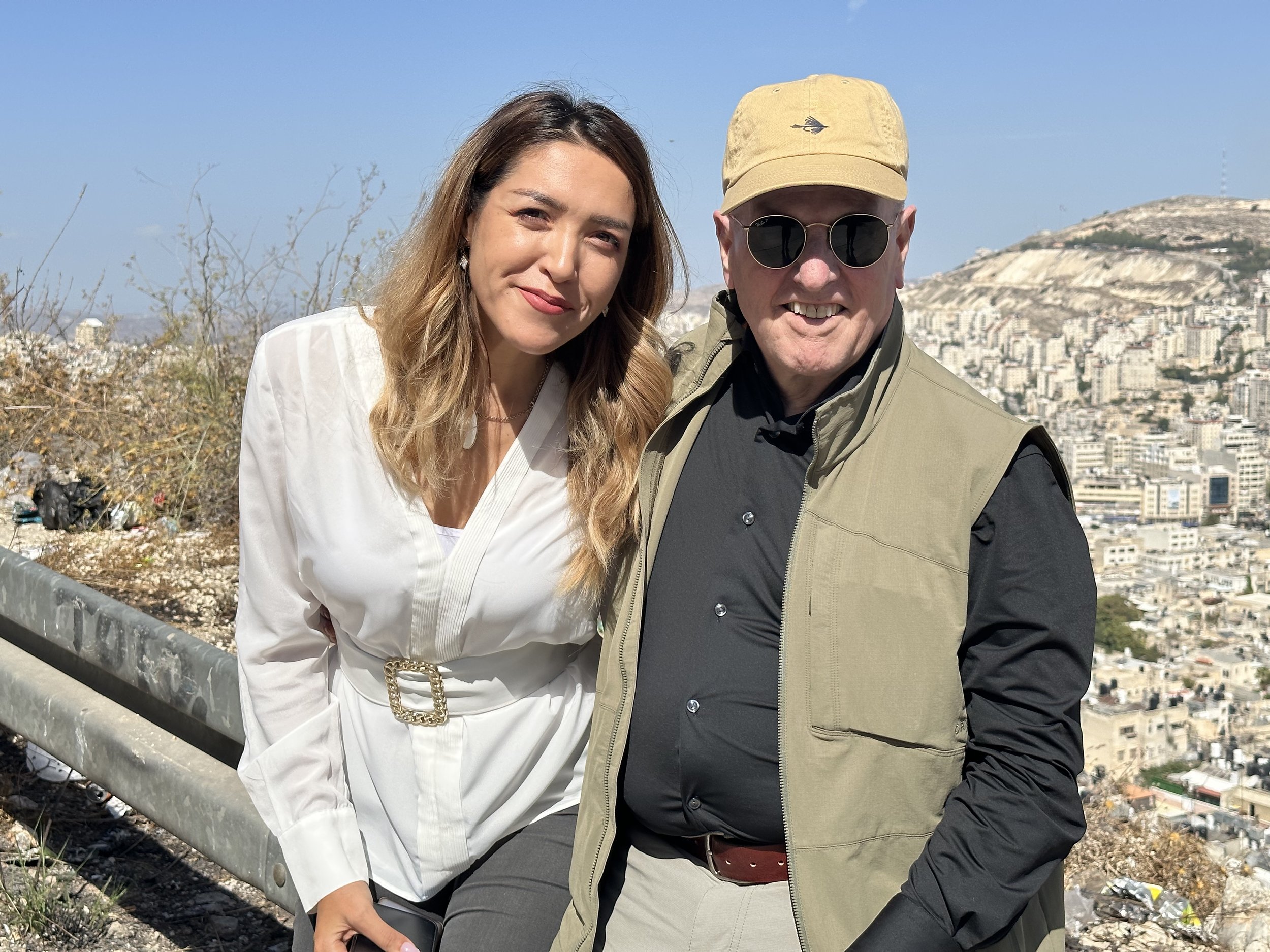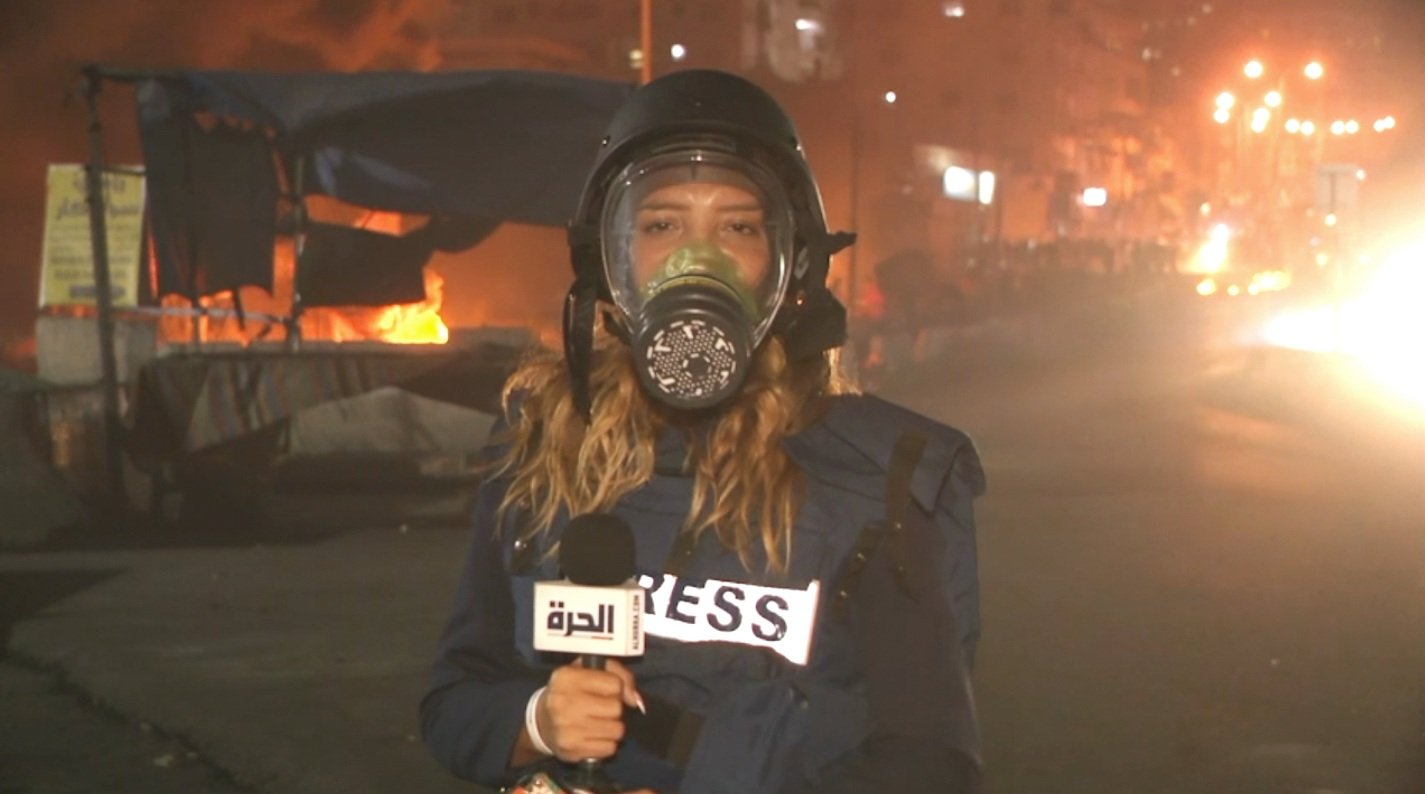Risking it All to Get the Story
Tharwat Shagrah looks out of her office window and points toward a cluster of buildings on a nearby hill. “That’s the President’s house up there,” she says, “Yassar Arafat’s grave is up there, too.” The president is Mahmoud Abbas, the eighty-seven-year-old head of the Palestinian state, and the grave is that of Abbas’s predecessor, Arafat, the long-time champion of the Palestinian people. Arafat died in 2004. The world that Tharwat covers stretches far beyond the view from her window, though. She has one of the most treacherous and challenging jobs in journalism: Covering the Israeli controlled West Bank as a Palestinian woman. “Every time I go out the door,” she says, “I feel like I’m going on a death journey.”
photo by Mohammed Ibrahim
At thirty-five with deep brown eyes and a warm smile, Tharwat’s youthful looks obscure her experience, audacity, and bravery. She’s been a journalist for twelve years and is on call twenty-four hours a day. She’s been tear-gassed by the Israeli Army, ducked rubber -- and real -- bullets while on assignment and works for an American financed broadcast news outlet often viewed as pro-Israeli by many Arabs but pro-Arab by Israelis, a status that can be deadly. She says she loves her life as a journalist, though: “I love it. This is my passion,” she says.
I spent some time with Tharwat just days before war broke out in Israel when Hamas, a militant group, unleashed its savage attack, killing hundreds of innocent people leading Israel to pulverize Hamas’s base in retaliation. The brutality that Hamas executed in the deadly exchanges in the Gaza Strip deserves the international condemnation it generated. But the violence also overshadows the legitimate Palestinian grievances that Tharwat deals with every day on her West Bank news beat. Indeed, Israel’s callous treatment of West Bank Palestinians is at the heart of the long-simmering conflict.
Journalist Tharwat Shagrah, reporter for Alhurra with James O’Shea
Tharwat coves a 2,266 square-mile patch of territory about the size of Delaware that is home to about 3.4 million people, including some 2.7 million Palestinians and an estimated 670,000 Israelis. Her job often involves treacherous travel to the northern reaches of the West Bank, places such as Jenin or Nablus, a huge city about an hour and a half drive north of Ramallah, which is considered the capital of Palestinian territories. One of her least favorite spots is near the entry to Ramallah, where the Israeli Army tear-gassed her while she was covering a confrontation between the army and members of the Palestinian resistance. The incident was captured on film. “I hated that,” she says, “No one wants to be seen as that vulnerable.”
A trip around the West Bank makes it easy to see why the surprise Hamas attack in Gaza raises questions about the competence of Israel’s legendary intelligence services. The West Bank resembles a police state. Military checkpoints, cameras and guard posts are everywhere. “They know everything,” Tharwat says, “They look at Facebook posts, email, everything. If Palestinians are planning a protest, they are there before the protestors.” Some critics speculate that the Israeli Defense Force (IDF) might have been more attuned to the threat coming out of Gaza had its’ soldiers not spent so much time and resources protecting Israelis that illegally occupy land here.
Israel has maintained military control over large swaths of the Palestinian population in the West Bank for all but six months of its’ seventy-three-year history. The territory got its name because it stretches across the eastern border of Israel along the west banks of the Jorden River and most of the Dead Sea. Israel says its occupation of the land is necessary to protect its citizens from terrorist attacks, but the IDF soldiers also spends much of their time coddling people who represent a serious threat to Tharwat’s safety -- “Settlers,” violence-prone Jewish Israelis who seize and occupy land and compounds in the West Bank. One Human Rights Watch report describes the conditions that breed resentment and hostility in the Occupied Palestinian Territories.
“Across these areas and in most aspects of life,” the report says, “Israeli authorities methodically privilege Jewish Israelis and discriminate against Palestinians. Laws, policies, and statements by leading Israeli officials make it plain that Jewish control over demographics, political power, and land has long guided government policy. Authorities have dispossessed, confined, forcibly separated and subjugated Palestinians by virtue of their identity to varying degrees of intensity. In certain areas, these deprivations are so severe that they amount to crimes against humanity of apartheid and persecution.”
Israel, of course, disputes such characterizations. Nonetheless, the settler movement has been widely condemned, and its’ seizure of land deemed illegal in many forums. The intensity of feelings on both sides crystalizes the challenges facing Tharwat. Her mission is to deliver to her audience fair and balanced journalism on the troubles. “This is the place where I can deliver the truth to the people” she says of her job for the Middle East Broadcasting Networks (MBN), an American financed news broadcaster set up to provide objective news to the Middle East and North Africa.
Journalist Tharwat Shagrah, reporting for Alhurra
Tharwat reports mainly for Alhurra, the major broadcast news outlet for the MBN, where I am chairman of the board. To gain insights into the MBN’s operations and its staff of journalists, I visited most of the MBN offices across the region. But my time with Tharwat was the most intense even before the atrocities in Gaza, which is also considered part of the West Bank.
Covering armed confrontations between the ubiquitous IDF forces and the Palestinian resistance often places Tharwat in dangerous places near and far. “In Gaza and Lebanon,” she says, “it is very, very dangerous. Rockets come down and you hide. But here [in Ramallah, Nablus and Jenin], you don’t know what is coming, when it’s coming. or from where. It could be the IDF or a Settler. It could be a stone thrown at you or a gun. You have to expect anything.” Tharwat says attacks launched by Settlers, who are protected by the IDF, make her travels to news hot spots particularly perilous. “They start by coming here in caravans and parking them,” she says.
The land the Israelis Settlers occupy is part of what was supposed to become a Palestinian state under a 1947 United Nations agreement. But a combination of Israel’s military might and an ineffectual Palestinian Authority, the official government body headed by President Abbas, gives Israel the means to seize control of much of the West Bank. Outposts that start off as miliary compounds often turn into settlements populated by Israelis motivated by deeply held religious beliefs that the land they occupy is theirs.
Footage of violence by Settlers/Palestinian by Alhurra
The reasoning behind settlements ranges from biblical arguments to practical considerations. Housing is often cheap and services like roads are good thanks to large subsidies by the Israeli government and IDF protection. “See where that is located,” Tharwat says as she points to a massive Settler community surrounded by a large wall topped with concertina wire north of Ramallah. “They are all on hilltops,” or on land strategically located to bolster military defenses and contain any expansion of nearby Palestinian communities. As of early 2023, there are 144 settlements spread around all areas considered part of the West Bank.
Footage of violence by Settlers/Palestinian by Alhurra
When Tharwat and her cameraman travel north to cover the scenes of many confrontations in places like Jenin or Nablus, Settlers often launch roadside attacks at passing cars or raid villages to attack or harass local residents. She can be heading elsewhere but stops to cover the exchanges. “They throw rocks or shoot at you” she says, or they engage in fights with Palestinians in which she and her cameraman can easily get caught in the crossfire. “We did a story about one family that had an olive garden. That was really the only thing they had to support themselves. Settlers came there and burned it.”
Why? To drive Palestinians off land Settlers can later populate.
One incident in Jenin about a year ago rattled her beyond all experiences, though. IDF forces often invade Jenin because the army says the local refugee camp harbors a nest of terrorists. In response, the Palestinian resistance often launches attacks aimed at the IDF. During one incursion, IDF forces killed a journalist, Shireen Abu Akleh, a highly respected reporter for Al Jazeera, the Arab broadcast channel owned by Qatar. Abu Akleh also was an American citizen. “That changed everything,” Tharwat says. Several investigations uncovered significant evidence that an IDF sniper deliberately killed her. The IDF says Abu Akleh’s death was a case of mistaken identity, but journalists like Tharwat look at inpartial investigations that conclude the IDF deliberately killed her.
“We live here, we work here.” she says. “I don’t understand what fear looks like, but I now know what is feels like. After that incident, everything changed for me. She was wearing a helmet like mine. She had a vest that was clearly marked “Press.” Now I keep hearing the sound of bullets. Sometimes I hear them like in a dream. And then when I really hear them, I think one of them is coming for me, it’s going to come into my body.”
Now that her beat is engulfed in war, the whole area is on a hair trigger. “Just two days ago,” she says, “a young man was shot dead behind me while I was on air at the checkpoint Kalandiya that you went through when you were here.”
—James O’Shea
James O’Shea is a longtime Chicago author and journalist who now lives in North Carolina. He is the author of several books and is the former editor of the Los Angeles Times and managing editor of the Chicago Tribune. Follow Jim’s Five W’s Substack here.
Any opinions or observations in this blog are purely those of the author and do not represent the official positions of the Middle East Broadcasting Networks (MBN) or of the U.S. State Department’s Agency for Global Media, which administers federal grants to the MBN.




